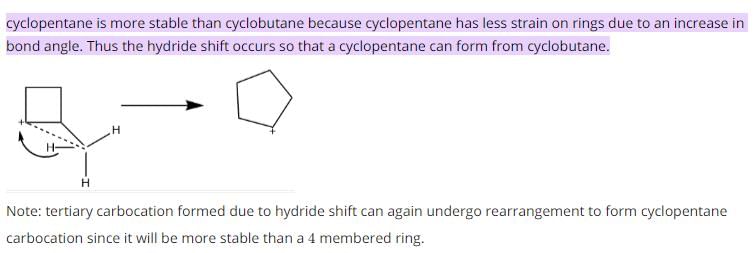Chemistry Exam > Chemistry Questions > Which of the following is most likely to unde...
Start Learning for Free
Which of the following is most likely to undergo a favourable hydride shift?
- a)

- b)

- c)

- d)

Correct answer is option 'D'. Can you explain this answer?
Verified Answer
Which of the following is most likely to undergo a favourable hydride ...

Most Upvoted Answer
Which of the following is most likely to undergo a favourable hydride ...
I think A should be the right option.
in the second compound there is no possibility of hydride transfer for obvious reason. in case of 4th one it's already somewhat stabilised due to the presence of 3 hyperconjugative hydrogen atoms and there is no sort of angular strain. now if we look at the third compound, you see it's unstable but it can also gain a certain amount of stabilization due to fragmentation and again no angle strain is present in this one. Now look at the first compound, hydride transfer is the ONLY WAY to attain stability, in addition to that there's angle strain(positive charge is present on the ring) so it's most likely to undergo hydride transfer imo.
in the second compound there is no possibility of hydride transfer for obvious reason. in case of 4th one it's already somewhat stabilised due to the presence of 3 hyperconjugative hydrogen atoms and there is no sort of angular strain. now if we look at the third compound, you see it's unstable but it can also gain a certain amount of stabilization due to fragmentation and again no angle strain is present in this one. Now look at the first compound, hydride transfer is the ONLY WAY to attain stability, in addition to that there's angle strain(positive charge is present on the ring) so it's most likely to undergo hydride transfer imo.
Free Test
FREE
| Start Free Test |
Community Answer
Which of the following is most likely to undergo a favourable hydride ...
Bcz in option d ..after hydride shift there will be formation of tertiary carbocation which is most stable among them.

|
Explore Courses for Chemistry exam
|

|
Question Description
Which of the following is most likely to undergo a favourable hydride shift?a)b)c)d)Correct answer is option 'D'. Can you explain this answer? for Chemistry 2025 is part of Chemistry preparation. The Question and answers have been prepared according to the Chemistry exam syllabus. Information about Which of the following is most likely to undergo a favourable hydride shift?a)b)c)d)Correct answer is option 'D'. Can you explain this answer? covers all topics & solutions for Chemistry 2025 Exam. Find important definitions, questions, meanings, examples, exercises and tests below for Which of the following is most likely to undergo a favourable hydride shift?a)b)c)d)Correct answer is option 'D'. Can you explain this answer?.
Which of the following is most likely to undergo a favourable hydride shift?a)b)c)d)Correct answer is option 'D'. Can you explain this answer? for Chemistry 2025 is part of Chemistry preparation. The Question and answers have been prepared according to the Chemistry exam syllabus. Information about Which of the following is most likely to undergo a favourable hydride shift?a)b)c)d)Correct answer is option 'D'. Can you explain this answer? covers all topics & solutions for Chemistry 2025 Exam. Find important definitions, questions, meanings, examples, exercises and tests below for Which of the following is most likely to undergo a favourable hydride shift?a)b)c)d)Correct answer is option 'D'. Can you explain this answer?.
Solutions for Which of the following is most likely to undergo a favourable hydride shift?a)b)c)d)Correct answer is option 'D'. Can you explain this answer? in English & in Hindi are available as part of our courses for Chemistry.
Download more important topics, notes, lectures and mock test series for Chemistry Exam by signing up for free.
Here you can find the meaning of Which of the following is most likely to undergo a favourable hydride shift?a)b)c)d)Correct answer is option 'D'. Can you explain this answer? defined & explained in the simplest way possible. Besides giving the explanation of
Which of the following is most likely to undergo a favourable hydride shift?a)b)c)d)Correct answer is option 'D'. Can you explain this answer?, a detailed solution for Which of the following is most likely to undergo a favourable hydride shift?a)b)c)d)Correct answer is option 'D'. Can you explain this answer? has been provided alongside types of Which of the following is most likely to undergo a favourable hydride shift?a)b)c)d)Correct answer is option 'D'. Can you explain this answer? theory, EduRev gives you an
ample number of questions to practice Which of the following is most likely to undergo a favourable hydride shift?a)b)c)d)Correct answer is option 'D'. Can you explain this answer? tests, examples and also practice Chemistry tests.

|
Explore Courses for Chemistry exam
|

|
Signup for Free!
Signup to see your scores go up within 7 days! Learn & Practice with 1000+ FREE Notes, Videos & Tests.


















